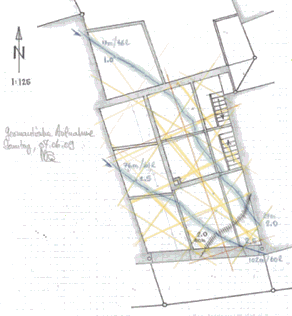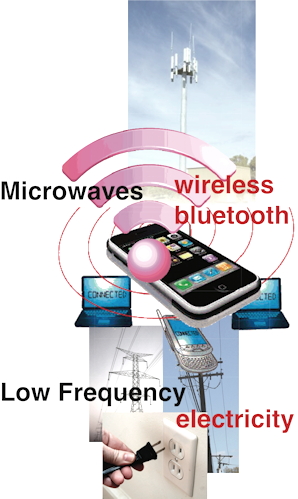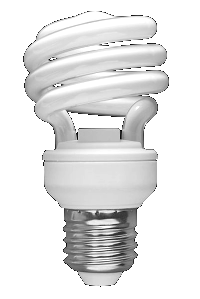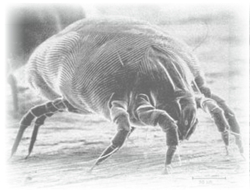 Human
Science
Human
ScienceEarth Science
| home | contact | about TOLK |
disclaimer |
o we research, we provide professional assessments and develop solutions
o we love to share our expert knowledge
o we inform, educate and provide training
| home | |
| Geopathy | |
| Dowsing | |
| Electrosmog |
Pioneering work on this field is developing in Germany and Switzerland, the German term “Bau-Biologie” is established – meaning “the biology of constructions (buildings)”. The English-speaking world, however, has not established a generally accepted term for it yet, so let’s call it “Environmental Biology” for now.
Environmental Biologists are researching effects of your immediate environment thus being able to point out risks on health and well-being which have not been considered by architects, constructors and perhaps by you yourself so far.
Environmental biology consultants are assessing natural energetic and biological factors (geopathy, micro organisms, mould etc.) as well as man made pollutants like electrosmog (electromagnetic garbage produced by electrical power systems and appliances, radio communication and wireless technology) and high risk bio-chemical pollutants used e.g. in building materials, colors, textiles and furniture.
 As
an example for early findings in environmental biology: In the late
60ies of the last century, asbestos became widely used in construction
materials for almost two decades. By the time, asbestos - a natural
mineral - seemed to be a true miracle ingredient, highly valued for
it’s stability, fire protection and insulating
characteristics.
Only decades later, it became obvious that asbestos
“evaporates” continuously in for of micro dust out
of these
materials and is a high risk cancer supporting pollutant for humans.
Another such hazard is the radioactive element radon that can be
present in high concentrations in bricks, tiles, pottery, glazing
etc.
As
an example for early findings in environmental biology: In the late
60ies of the last century, asbestos became widely used in construction
materials for almost two decades. By the time, asbestos - a natural
mineral - seemed to be a true miracle ingredient, highly valued for
it’s stability, fire protection and insulating
characteristics.
Only decades later, it became obvious that asbestos
“evaporates” continuously in for of micro dust out
of these
materials and is a high risk cancer supporting pollutant for humans.
Another such hazard is the radioactive element radon that can be
present in high concentrations in bricks, tiles, pottery, glazing
etc. asbestos fibers formerly widely used in many materials
Formaldehydes and similar organic materials are very common components of plastics, lacquers, varnish, glues, softeners and body care products present in almost every household and building. Formaldehydes continuously evaporate, they are often the hidden cause of nasty allergies and other lasting health issues.
A professional environmental biologist can be of great service to you. Here are a few major themes he would normally focus on when assessing your personal living and working situation - please click on a topic below to learn more:
Geopathic Environment
 As
environmental biologists, we assess the natural energetic situation of
your living and working spaces. The result is a plan that allows you to
arrange your furniture in a way to avoid spending many hours regularly
at low energy spots, thereby draining your body’s capacity to
recover.
As
environmental biologists, we assess the natural energetic situation of
your living and working spaces. The result is a plan that allows you to
arrange your furniture in a way to avoid spending many hours regularly
at low energy spots, thereby draining your body’s capacity to
recover.We also make suggestions and provide means to improve the energetic environment of crucial living spaces such as bedroom, children’s rooms and office work places.
To learn more about the energetic environment see “Geopathy” or contact us right here -> contact TOLK
<– back to index
Electrosmog

Electrosmog is another word for electromagnetic waste produced by the mass of electric, electronic and wireless devices in daily use. It is a kind of pollution that is harmful and particularly tricky because it is omnipresent in an urban situation and we do not have any built in warnings, no senses to protect us. It is invisible, untouchable and doesn’t sound nor smell. Our bodies are exposed to it defenselessly.
We strongly recommend that you do take this rapidly increasing threat to your health seriously. There is much you can do to reduce your own attribution to this danger. Please read more here on “Elecrosmog”.
As environmental biologists we assess your own electromagnetic environment and advise in ways to reduce hazards to your health.
For more information please consult the page "Electrosmog" or contact us here -> contact TOLK
<– back to index
Lighting and Climate
Lighting and climate play an important role for our well-being. Our bodies are designed for a specific climatic situation as well as a particular intensity and quality of light and a particular daily rhythm of light and dark to function well. The closer we get to that optimum, the healthier we remain and the better we feel.
 Light and climate have a direct impact on our
mood and our general performance. If we continuously expose ourselves
to wrong lighting and climate, most likely some health issues will be
the long term result. As this affects everyone at his individual weak
point first, medical science has troubles connecting symptoms with a
wrong environment.
Light and climate have a direct impact on our
mood and our general performance. If we continuously expose ourselves
to wrong lighting and climate, most likely some health issues will be
the long term result. As this affects everyone at his individual weak
point first, medical science has troubles connecting symptoms with a
wrong environment. Many sources of artificial light are less suitable than we generally are made to believe. Halogen, neon gas and power saving bulbs produce a kind of “hard” light which can produce headaches, migraines, and EHS (electromagnetic hypersensitivity). Unlike conventional bulbs, they also emit considerable electrosmog (microwaves) and contain highly poisonous materials (e.g. mercury), a real threat to recycling.
The climate an environmental biologist assesses has nothing to do with the country's general geographic climate. It is rather the artificial climate that directly surrounds us in buildings, airplanes, cars etc. Particularly important for our health is – apart from polluting factors - the relationship between air temperature and humidity. It directly affects our largest multifunctional organ, the skin and has a great influence on the hydration - hence the metabolism - of our body.
For more information about how your lighting and climate affects your well-being and how to improve both please contact us here on -> contact TOLK
<– back to index
Chemical Pollutants
Chemical pollutants are a threat to human health since several millennia. The ancient Romans were starting to use water tubes made of lead, a highly poisonous heavy metal. Mercury was believed to be the miracle cure for many diseases since the late Middle Ages which is the probable cause of death for young Wolfgang Amadeus Mozart. The Chinese believed it enhances potency – with disastrous results.
 Only very recently, medical
science has discovered the dangers. Heavy metals, however, are widely
used in power saving lighting, electronic devices, paints, varnishing,
glues etc.
Only very recently, medical
science has discovered the dangers. Heavy metals, however, are widely
used in power saving lighting, electronic devices, paints, varnishing,
glues etc.The living space of humans has dramatically changed in the past decades. In modern living space, we hardly find anything that isn’t painted, coated, varnished, chemically „treated“ or entirely made of artificial materials like plastics.
Plastics and paints are not all that harmless, though. They are submitted to mechanical use and are affected e.g. by UV light evaporating continuously poisonous substances such as formaldehyde, chlorides and heavy metals in form of gas or micro dust. Chemical pollutants in your environment are most likely the primary cause for allergies and respiratory diseases and most of them increase cancer risk. They affect us all continuously, not only the smokers, particularly our children.
An environmental biologist assesses your living space for presence of chemical pollution. For more information pleas contact us here on –> contact TOLK
<– back to index
Biological Hasards
Biological hazards are threats to our health produced by indoor microorganisms such as dust mites or mould. Hidden little paradises for bacteria can also become a serious risk for your health.
Moulds thrive simply everywhere on the planet and are probably the best survivors of all living beings. The risk is not the moulds themselves but rather their spores. They are extremely small and float in the air. Through our lungs they are able to get into our system. Some oft the common moulds are extremely dangerous (e.g. aspergillus niger) and increase risk of cancer in high concentrations.
 Another invincible inhabitant of virtually every
human living space is the dust mite. The dust mite is a microscopic
animal belonging to the class of spiders and is related to ticks. It
doesn’t bite, it feeds on organic waste particularly on hair
and skin particles and it loves warm spaces. As such, it is absolutely
harmless for humans and pets.
Another invincible inhabitant of virtually every
human living space is the dust mite. The dust mite is a microscopic
animal belonging to the class of spiders and is related to ticks. It
doesn’t bite, it feeds on organic waste particularly on hair
and skin particles and it loves warm spaces. As such, it is absolutely
harmless for humans and pets. It’s feces, however, float in the air. When in contact with mucous membranes of eyes and nose, it causes itchiness as well as respiratory troubles and asthma. Since furry pets are excellent food producers for dust mites, mites thrive with indoor pets. Most people who believe to suffer from cat or dog allergy actually are affected by the high concentration of mite feces that comes along with pets.
Any living space is always inhabited by a multitude of different micro organisms. Normally, they all are harmless and often even very helpful. Only when the natural balance is disturbed – as it always is in an artificial environment like a home or an office – can they become a threat to your health.
An environmental biologist assesses your living space for such biological threats and suggests improvements. For more details please contact us on –> contact TOLK
<– back to index
o we research, we provide professional assessments and develop solutions
o we love to share our expert knowledge
o we inform, educate and provide training
| home | contact | about TOLK |
disclaimer |


 deutsch
deutsch